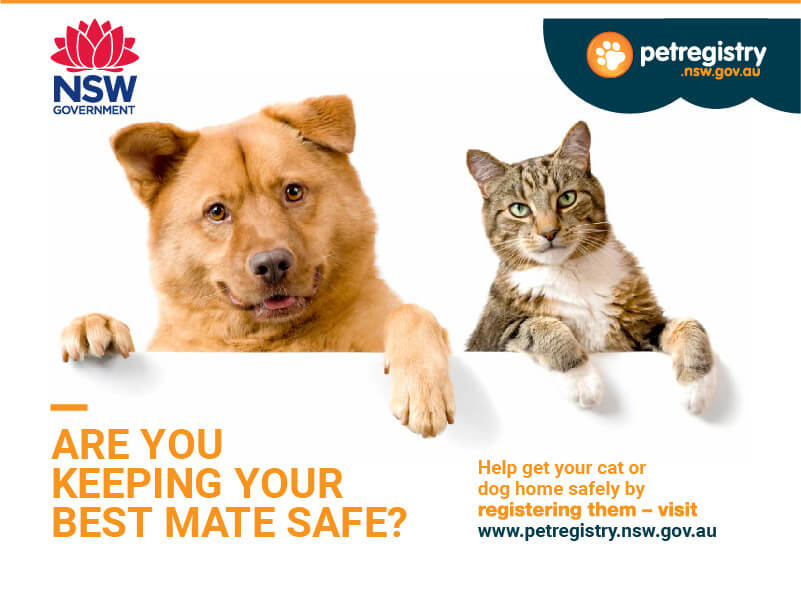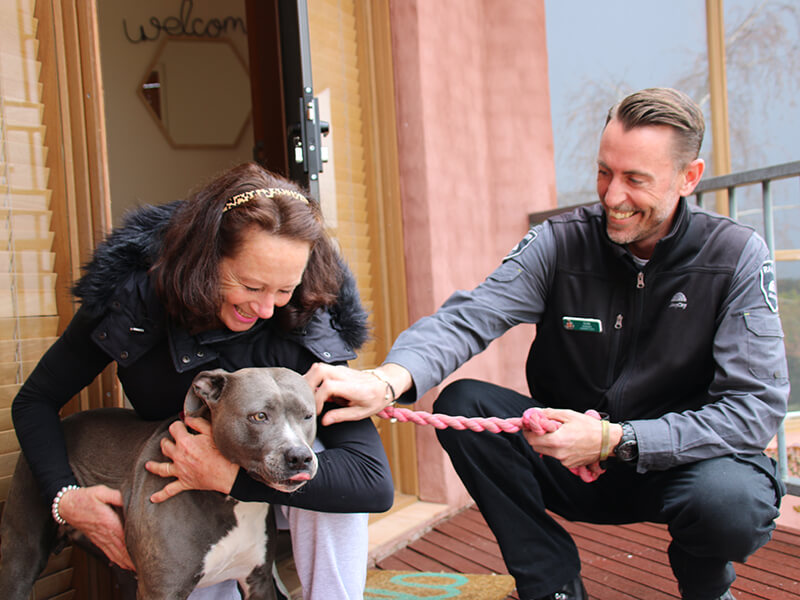Pets bring great pleasure to many of our residents and are good for our collective wellbeing.
We support the community with services that ensure pets and people remain healthy and safe, and live together harmoniously.
We encourage owners to be responsible for their pets and require them to undertake some simple measures.
We also encourage you to get your pet desexed – a simple procedure that helps pets to live longer and healthier lives, and makes them less prone to wander and fight.
Our suggested 3-step process for pet owners:
-
Microchip your pet keyboard_arrow_right
All dogs and cats must be microchipped before they are 12 weeks of age.
Microchipping is a quick and harmless procedure where a small microchip is inserted between your pet's shoulder blades.
If your microchipped pet goes astray and is taken to a vet, pound or shelter, we use the microchip's data to contact you and quickly reunite you with your pet.
Our rangers provide microchipping for local residents at a cost of $35 per animal.
How to microchip your pet
Microchipping can be provided by:
- Contacting AlburyCity on 0260 238 111 to arrange a Ranger to attend to microchip your pet at home
- Contacting Albury Animal Care Centre on 0260 438 530 to make an appointment or drop in during their office hours
- Contacting your local vet or animal welfare organisation
When your pet is microchipped:
- The authorised implanter will ask you to fill in the permanent ID form.
- Send the completed form to us:
- AlburyCity
Compliance Team
PO Box 323
Albury, NSW 2640
- AlburyCity
- We will enter the information from your form onto the NSW Companion Animal Register. There is no fee for this. We will then send you a certificate of identification.
- You need to keep your certificate of identification so you can register your pet before it is 6 months old.
What if my pet was microchipped in another state?
If your dog or cat was microchipped elsewhere and you move to NSW, you will need to register your pet in NSW. To have your microchipping details updated, complete a permanent identification P1A form and submit to your local vet or council.
To check other state databases, contact Albury Animal Care Centre on 0260 438 530 who can advise you on how to update this information.
-
Register your pet keyboard_arrow_right
Register your pet
Registration keeps pets safe
All dogs and cats must be registered before they are 12 weeks of age.
If your pet goes astray, the Albury Animal Care Facility or Vet can use your pet's microchip and registration details to contact you and quickly reunite you with your pet.
Registration is cheaper if your pet is already desexed.
NSW pet registry
Pet owners and breeders can create an online profile with the NSW pet registry. You can update your details, notify if your dog or cat is missing, register ownership changes and pay registration fees online.
Breeders are issued with a breeder identification number to record owner and animal information to help track litters over time.
Vets are required to update the register when they desex cats and dogs. Vets are also able to update the register if they believe a pet should not be desexed for medical reasons.
Before you register
Make sure your pet is already microchipped and that you have received your certificate of identification.
-
Change your pet registration keyboard_arrow_right
Change of details
Your owner information needs to be kept up-to-date. If your situation changes, you must notify us so we can update your pet registration details. With an up-to-date register we can easily contact owners when a lost or missing pet is found.
- If you change your address, fill out the change of address form
- If you sell or give your pet to a new owner, fill out the change of owner/details form
Post your completed form to us or take it to a customer service centre.
You may be fined if you don't let us know when your pet is sold or given to a new owner.
Has your pet passed away?
If your cat or dog passes away, you need to let us know within 28 days.
We will cancel your pet's registration and you will no longer receive notifications from us about your pet.
Moving to NSW with your pet?
If you are moving with your pet to Albury from another state or country, and the previous owner cannot be found you will need to identify and register your pet in NSW. You will need to provide us with:
- A copy of the bill of sale.
- A statutory declaration outlining the circumstances of sale or proof of ownership.
- A completed permanent identification form.
- A completed verification of existing microchip form signed by an authorised identifier, such as a vet.
- A completed lifetime registration form.
Can you no longer care for your pet?
We do not accept surrendered animals. If you are no longer able to care for your pet please contact the RSPCA, Cat Protection Society, Animal Welfare League or your local animal shelter for advice.
It is illegal to dump or abandon your animal and animal cruelty charges apply.
-
Desex your pet keyboard_arrow_right
Desexed pets are healthier pets
We encourage all cat and dog owners to get their pets desexed.
Desexing is when a vet removes part of a pet’s reproductive system while it is under a general anaesthetic, so that the pet cannot breed.
It is a common procedure, and pets recover quickly.
Why desex pets?
Australia already has too many unwanted animals, and hundreds of thousands of animals are put down each year.
Many unwanted litters are born because owners don’t get around to desexing their pet in time.
Cats can become pregnant at just 4 months old, and dogs can become pregnant at 5 months.
If a cat continues to have litters (at 4 to 6 kittens per litter), and her offspring breeds for 7 years, this can add 420,000 new cats to the population.
Desexed pets:
- live longer and healthier lives, and are less prone to wander, fight and be anti-social.
- Reduces males trying to get out or roam to mate with a female dog in heat
- Minimises risks of cancer/infections in the uterus/testicles
It also costs less to register your pet if it is desexed.
Desexing new pets
- Book your puppy or kitten in for desexing by the time they are 6 months old. Desexing can be carried out safely on dogs and cats from the age of 12 weeks, although some vets prefer to wait until the animal is 5-6 months old.
- Desexing can be done by your local vet or the RSPCA. If your pet isn’t already microchipped, it’s a good idea to get that done on the same day.
- Once your pet is desexed, you will receive a desexing certificate. This will entitle you to a discount on pet registration, if your pet is not already registered.
Costs of not desexing your pet
If your undesexed female pet falls pregnant, you’ll need to find a new home for each puppy or kitten.
Dogs can have 10 or more puppies per litter, so finding homes for a whole litter can mean a lot of work for you.
Whether you sell or give them away, legally they have to be microchipped before they are old enough to go to their new home (at about 8 weeks old). Microchipping and vaccination will cost about $100 for each pup/kitten, plus they’ll need worm tablets, flea treatments and food (once they’ve been weaned) until they are adopted.
If your male pet fathers a litter, you may be expected to help find new homes for the puppies or kittens and pay half the expenses. It is unacceptable and illegal to dump pets, and especially cruel to leave a litter of vulnerable puppies or kittens to fend for themselves. Dumping animals carries heavy penalties in NSW.
What if my pet has an unwanted litter?
If your pet does get pregnant and have an unwanted litter, please contact an animal welfare organisation, the RSPCA or the Albury Animal Care Facility.
It’s cruel and unacceptable to abandon unwanted puppies or kittens. We impose heavy fines for this inhumane action.



